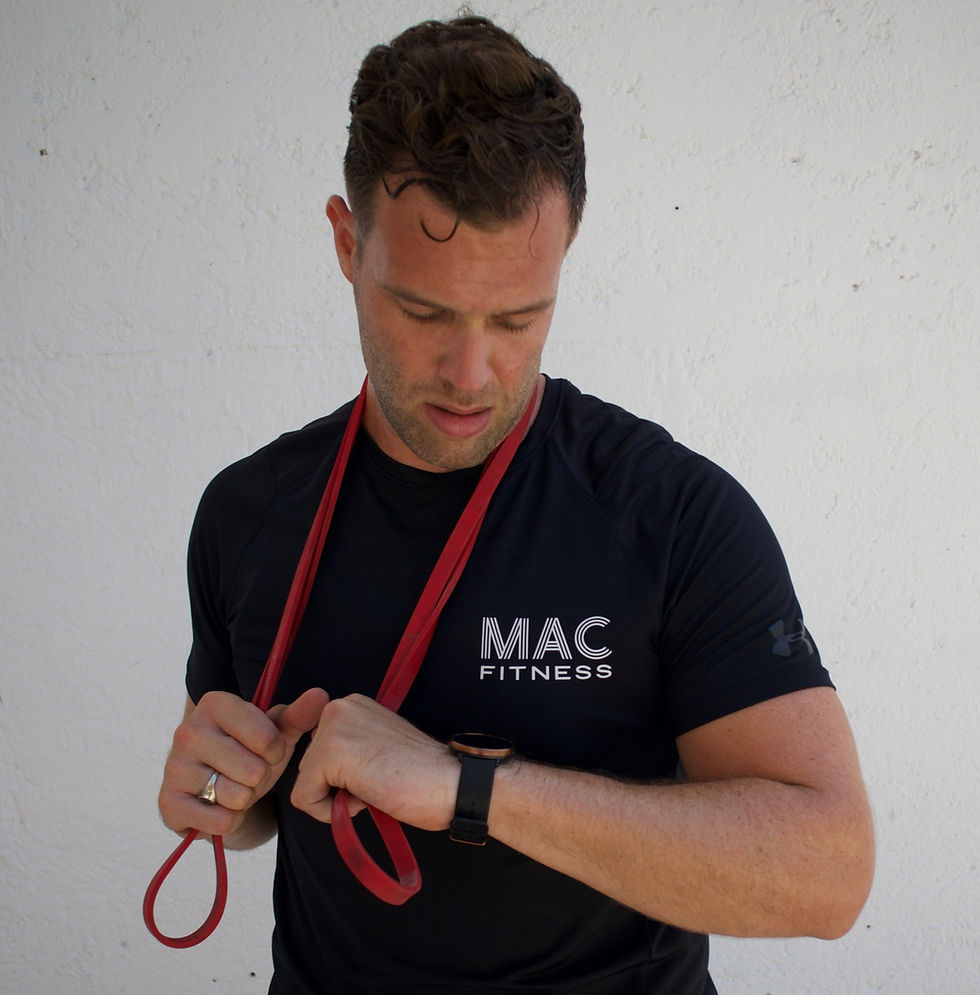5 Things I Wish I Knew When I Started Working Out
- Mike Mackey
- May 17, 2021
- 6 min read
For most people, getting into better shape is wrapped in a shroud of mystery.
How much should I eat? What should I eat?
How often should I work out? How do I balance strength training and cardio?
Do I even need to do cardio?
The answers to these questions are based solely on the individual asking, but in a world of misinformation, there is one thing that is that is undeniable: The world of exercise is a very confusing place.
First of all - how do you differentiate between health and fitness? Is there a difference?
Most will say that they exercise for better health, but along the way, they often get lost in a world of training and eating in order to look a certain way.
There is a legitimate argument that confidence and a positive self-image are major aspects in physical and mental health, but the problem is that unrealistic goal-setting often leads to the opposite effect, and usually results in misguided attempts to regain "control."
I didn’t start working out until shortly after high school, and I didn’t start taking it seriously until several years later.
Fifteen years later, I’m still learning new things about myself, my clients, my audience and the industry as a whole.
What is the biggest takeaway?
It’s easy to understand why there is so much confusion.
"Train like this - don't train like that."
"Eat like this - don't eat like that."
"Results in 14 days guaranteed - but it takes more time than that."
"No pain, no gain" - but know how to distinguish between "good" pain and "bad" pain.
How in the hell do you know what to when the entire world has differing opinions?
Below is a list of the 5 major things I wish I knew when I started.
They are a major framework in my program creation, and they are often an eye-opener for my clients. The world of fitness has become so convoluted that most don't realize that it's much simpler than it's portrayed.
Move more. Move well. Find balance. Take care of body and mind. Find something you can do for life.
1. Don’t Look to Magazine Covers for Inspiration
When I got my first job as a trainer, I was in a new city where I knew absolutely nobody, and I was working in one of the busiest and most profitable gyms in the country.
It was intimidating, to say the least.
I was surrounded by a ton of very strong and muscular people - football players, powerlifters and bodybuilders, among them.
When it specifically came to bodybuilding, I had been exposed to something I never knew before - that magazine covers were littered with people who trained and dieted relentlessly for months in order to look like that for a couple of days.

It blew my mind.
I thought to myself, “huh, I guess it isn’t realistic for me to look like that after all.”
Despite my opinion, I witnessed so many people who have struggled, and continued to struggle, with achieving these unsustainable results.
Every person has their own reason for exercising, but for those who equate being extremely lean with being healthy, you would likely be surprised at how those fitness models felt during that photoshoot.
They'd likely tell you that they felt anything but energetic and happy.
Changing your body composition can be a great long-term goal to have, but the minute you start aiming to become an outlier, you're likely walking the fine line between health and fitness.
2. Being Jacked Doesn’t Automatically Make You a Good Coach
No offence to the jacked dudes - or dudettes - out there!
I've been around long enough to know that no matter what you do, building and maintaining muscle mass takes a ton of work and commitment.
BUT - the world of social media likely has you convinced that huge muscles and a six-pack represents top-tier coaching - when it doesn't.
Are some knowledgeable trainers jacked? Of course they are!

But some of the top minds in the industry aren’t, because it doesn’t suit their lifestyle. Or their sport of choice. Or their long-term goals.
When you see someone with massive legs or the ability to bench twice their bodyweight, it means that they found a routine that works for them - and more often than not, it won't work with someone else.
When you're searching for a coach, find someone who has your best interests at heart. Find someone with an extensive background, working with a variety of clients.
A good coach will listen to your goals, but also help you recognize when those goals may not be realistic - or even relevant.
A great coach can help you discover why you have the goals that you do, but also assist in making it a part of a routine that you can maintain forever.
If your goal is the get "huge", you don't necessarily need a "huge" coach to get there.
3. Mastering the Basics Isn’t Sexy - But it Works
This is the modern-day dilemma for online health professionals, primarily because Instagram has turned fitness into a talent show.

If you focus on mastering movement instead of training muscles, you will likely find that your results are better - and that they last longer.
This has been an issue in the mainstream media for years - you will often see very muscular people doing overly complicated exercises, usually involving a combination of different movements into a singular "flow."
Impressive? Sure. Necessary? Hell no.
The ironic thing about these complicated exercises is that they are often performed by a person with years of experience and a solid understanding of basic movement patterns, such as lunging or pressing. In doing so, they are able to combine them without compromising movement quality.
If you are relatively new (less than 12 months of experience), or haven't been consistently training for at least 6 months, there is literally no benefit for you.
It won't speed up your results.
You will plateau quicker - likely right away.
The risk of injury is way higher, and if you don't hurt yourself you will probably be sore constantly.
Master the basic movement patterns, take care of the major joints of the body, learn how to gradually and intelligently increase your intensity, and you will see years (not weeks) of progress.
4. Equally Value All Aspects of Health
The fastest way to results is making sure that you will still be working out 10 years from now.
What does that mean? It means that if you aren’t sure if you can sustain a workout program for the next couple of months, what makes you think you’re going to be able to keep doing it for life?

Most people who start a new routine do so with attaining results as fast as possible. They exercise more, they eat less (usually by cutting out foods that they deem "bad"), and they don't seem to place enough emphasis getting enough sleep and finding healthy outlets for stress.
Exercise is amazing, but as the old saying goes, it's possible to have too much of a good thing.
The average person only needs 2-4 strength training workouts per week. The rest should be activities you truly enjoy.
I love to strength train, but I have learned to recognize when I'm doing too much - my sleep quality suffers, my mood is off, and my energy levels are lower. I don't "push through" to force a workout, I either rest completely or find something else to do.
Walking and hiking is extremely underrated.
Low-intensity biking and swimming are amazing low-impact activities that actually aid recovery.
Learning to place equal emphasis on the MAC Foundational Four will help ensure that you remain strong and healthy into your golden years and beyond!
5. IT. TAKES. TIME.
Patience is the most undervalued aspect of health and fitness.
It’s a double edged sword - people want the results, but they don't want to endure the process of achieving them. They don't want to hear that it could takes months (or even years) to get there.
The unfortunate truth is that short-term usually results in long-term frustration.

I get it, I really do.
But think about it for a second - if someone came into your place of work, and asked to learn absolutely everything about your job in order to do it better than you - with little/no experience - you'd probably be offended, right?
Now imagine that they asked you to write down a plan for them. An all-encompassing plan that will account for everything that could possibly go wrong.
It seems unrealistic, right?
This is what it's like for legitimate health professionals who are asked for a "workout/nutrition plan." In theory, it might work for some people, but odds are, most people will run into trouble almost instantly.
The process is honestly one of the best things about health and fitness. With slow and steady progression, looking back to see how far you have come can be the ultimate motivation.
Don't only use the scale - because for some, the number may never change dramatically.
But you know what will?
Thinking about how hard it used to be to do single-leg exercises.
How sore you used to get because you have found a routine that challenges you appropriately.
How tired you used to be during a workout.
When you start focusing on performance-based goals, the other things - like weight loss or general aches and pains - tend to fall into place a lot easier.
At the root of every routine should be basic strength - gradually improving the intensity of the major movement patterns of the body. Some patterns may be great, while you may struggle with others. It's very common to have issues with the lower body, upper body, or both.
The right coach will show you how to modify it, not ignore it.
Once you accept that health and fitness is a long-term game, you can learn to appreciate every, single win...
And the more time you put into it, the more wins there will be.







Comments